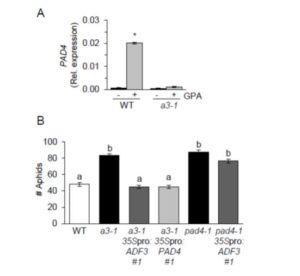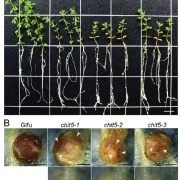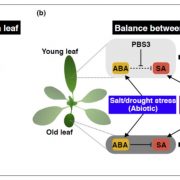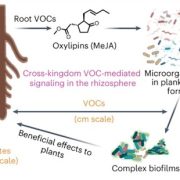Actin and Aphid Feeding
 Remodeling of the actin network in plant cells involves the severing, depolymerization and polymerization of F-actin. A variety of actin-binding proteins are involved in remodeling of the actin cytoskeleton, including the actin-depolymerizing factor (ADF) family of proteins. As a result of their ability to sever and depolymerize F-actin and yield products with ends that can serve as sites for new filament initiation, the ADFs increase the dynamics of the actin cytoskeleton and the balance of F- actin versus the free globular (G)-actin. ADF proteins, and profilin, an actin-binding protein that influences actin polymerization,
have previously been identified in phloem exudates from a variety of plants. Mondal et al. (10.1104/pp.17.01438) present evidence that ADF3 in the phloem of Arabidopsis thaliana is required for controlling infestation by green peach aphids (Myzus persicae). In agreement with a role for the actin-depolymerizing function of ADF3 in defense against green peach aphids, the authors show that the reduced resistance in the adf3 mutant is restored by overexpression of the related ADF4, as well as by actin cytoskeleton destabilizers, such as cytochalasin D and latrunculin B. Electrical monitoring of the aphid feeding behavior indicated that the aphid stylets located sieve elements faster when feeding on the adf3 mutant compared to the wild-type (WT) plant. In addition, once they found the sieve elements, the aphids fed for a more prolonged period from sieve elements of adf3 compared to the WT plant. The longer feeding period correlated
with an increase in fecundity and population size of the aphids and a parallel reduction in callose deposition in the adf3 mutant. The authors also demonstrate that the ADF3-dependent defense mechanism is linked to the transcriptional upregulation of PHYTOALEXIN-DEFICIENT4, an important regulator of defenses against the green peach aphid.
Remodeling of the actin network in plant cells involves the severing, depolymerization and polymerization of F-actin. A variety of actin-binding proteins are involved in remodeling of the actin cytoskeleton, including the actin-depolymerizing factor (ADF) family of proteins. As a result of their ability to sever and depolymerize F-actin and yield products with ends that can serve as sites for new filament initiation, the ADFs increase the dynamics of the actin cytoskeleton and the balance of F- actin versus the free globular (G)-actin. ADF proteins, and profilin, an actin-binding protein that influences actin polymerization,
have previously been identified in phloem exudates from a variety of plants. Mondal et al. (10.1104/pp.17.01438) present evidence that ADF3 in the phloem of Arabidopsis thaliana is required for controlling infestation by green peach aphids (Myzus persicae). In agreement with a role for the actin-depolymerizing function of ADF3 in defense against green peach aphids, the authors show that the reduced resistance in the adf3 mutant is restored by overexpression of the related ADF4, as well as by actin cytoskeleton destabilizers, such as cytochalasin D and latrunculin B. Electrical monitoring of the aphid feeding behavior indicated that the aphid stylets located sieve elements faster when feeding on the adf3 mutant compared to the wild-type (WT) plant. In addition, once they found the sieve elements, the aphids fed for a more prolonged period from sieve elements of adf3 compared to the WT plant. The longer feeding period correlated
with an increase in fecundity and population size of the aphids and a parallel reduction in callose deposition in the adf3 mutant. The authors also demonstrate that the ADF3-dependent defense mechanism is linked to the transcriptional upregulation of PHYTOALEXIN-DEFICIENT4, an important regulator of defenses against the green peach aphid.









